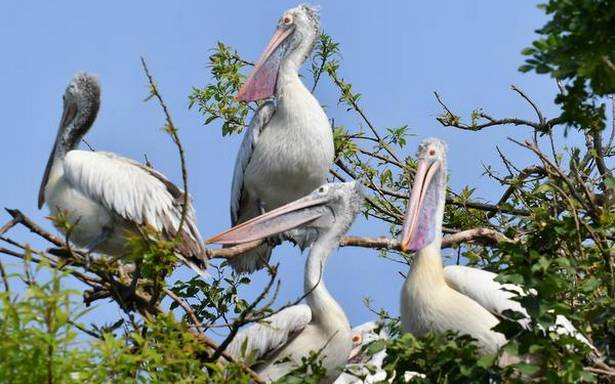Scientists of the Wildlife Institute of India (WII), Dehradun, will geotag the spot-billed pelicans at Kokkrebellur in Mandya district to track their flight path and study their migratory patterns.
The exercise, being conducted for the first time for the pelicans at the community reserve located off the Bengaluru-Mysuru highway near Maddur, will help understand the habitat preferred by the birds. This will help initiate conservation measures through suitable interventions, apart from throwing light on their nesting patterns and breeding biology.
The Deputy Conservator of Forests, V. Karikalan, told The Hindu that around 250 pelicans come to roost at Kokkrebellur during peak season, and this is in addition to painted storks.
The pelicans which arrive at Kokkrebellur around October or November tend to roost for an extended period of time lasting up to six months. But their whereabouts are not known for the remaining period and geotagging will to help not only track their movement but also ascertain the preferential habitats of these birds in different seasons and at different locations, said Mr. Karikalan.
Though many pelicans are also sighted at Ranganathittu Bird Sanctuary, Lingambudhi Kere, and Karanji Nature Park in Mysuru, among others, it is not possible to establish if these are the same birds that have flown from Kokkrebellur, he added.
The Forest Department will fund the geotagging of the birds, and as each tag costs between ₹1.5 lakh and ₹2 lakh, only a handful of birds will be tagged and their movement tracked on a real-time basis.
In the past, the birds used to be ringed and provided with an identity tag, and ornithologists and birders would identify them and confirm their presence in different location when sighted in those places. But their flight path remained unknown as ringing the birds with ID tags did not provide for real-time monitoring to track their movement, said K. Manu of Mysore Amateur Naturalists (MAN) who has worked extensively at Kokkrebellur. There are a little more than a dozen breeding sites of spot-billed pelicans in the country and Kokkrebellur is one of them, he said.
Mr. Karikalan said that once the migratory path of the birds is established, the Forest Department can take measures to shore up the habitat where the pelicans tend to roost before their onward flight. He said in case the water source is being polluted or trees where the birds roost are being felled, suitable intervention can be made to check this.
Source: Read Full Article

